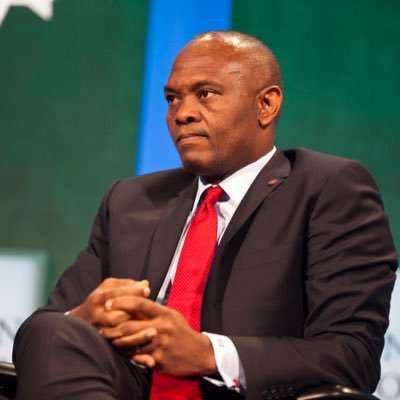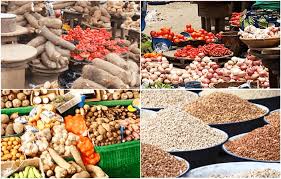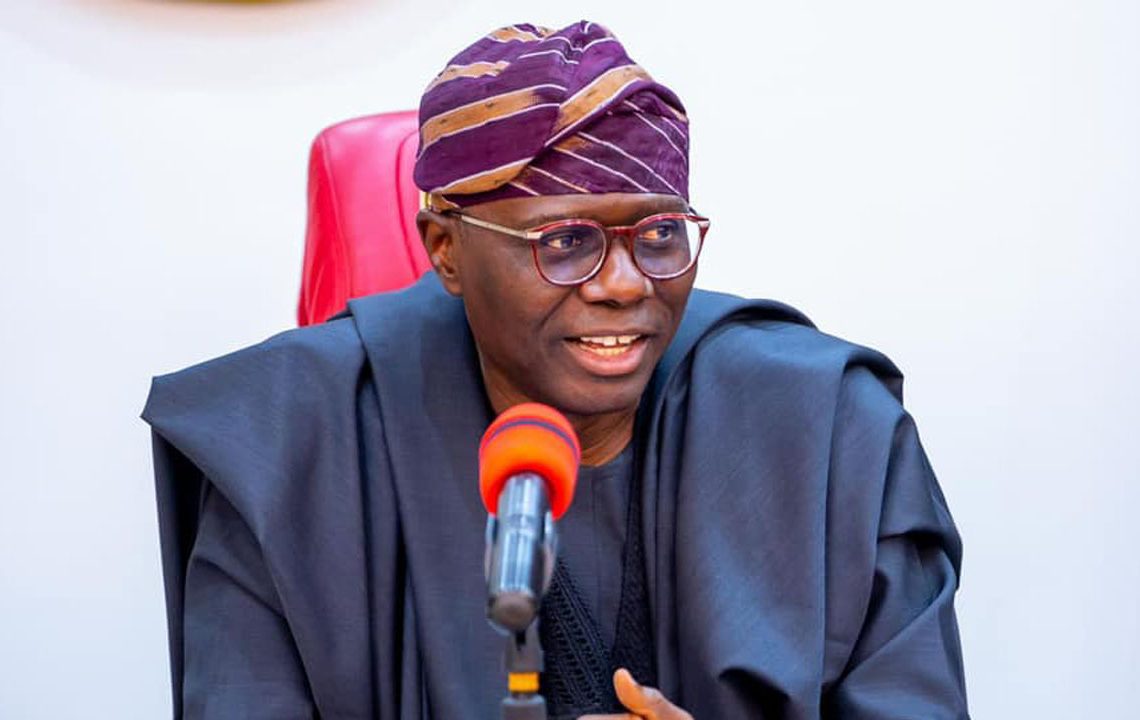Lagos State government has launched the Produce for Lagos Programme alongside a groundbreaking ₦500 billion Offtake Guarantee Fund, a move designed to tackle the menace of food insecurity in the state.
The initiative, unveiled at the Lagos House in Ikeja, is designed to secure the state’s food supply, generate employment, and catalyse a new era of national agricultural prosperity.
The state governor, Babajide Sanwo-Olu, described the launch as a defining moment in the state’s commitment to food security and economic resilience. “Today is a watershed moment in our shared commitment to achieving food security, inclusive prosperity, and sustainable growth—not just for Lagos State, but for Nigeria,” he said.
The governor underscored Lagos’ immense role in Nigeria’s food economy, noting that it is the country’s largest food market, consuming over 50 per cent of the food traded in the Southwest. He revealed that the state’s food economy, once valued at ₦6.5 trillion annually, has now grown to ₦16.14 trillion.
He, however, lamented that nearly 50 per cent of food in Lagos is lost between harvest and market due to inadequate storage and inefficient transportation. In response, he said the state launched the Agricultural and Food Systems Roadmap in 2021, a comprehensive strategy to address structural weaknesses.
According to the governor, Lagos has significantly increased its agriculture budget from ₦4.2 billion in 2018 to nearly ₦80 billion today—the highest in the state’s history.
As part of the renewed focus, he said the Ministry of Agriculture was renamed the Ministry of Agriculture and Food Systems in 2024 to reflect a broader strategic mandate.
The Produce for Lagos Programme, he said is the next step in implementing the food systems roadmap. The programme,,he explained will provide guaranteed offtake contracts, access to financing, and logistics support, connecting producers more directly to the state’s robust food economy.
At the heart of the programme is the ₦500 billion Offtake Guarantee Fund. The Governor emphasised that the fund is not a subsidy, but a strategic investment vehicle designed to de-risk agricultural operations.
He said: “This fund will provide crucial working capital for bulk traders, finance for logistics operators, liquidity for aggregators, and credit support for food producers across Nigeria. It is designed to catalyze private capital, stabilise food prices, and de-risk agricultural operations across the entire value chain.”
The programme, he added, will be implemented through the Lagos Food Systems Infrastructure Company (LAFSINCO), supported by the Lagos Bulk Trading Company, Ekolog (Eko Logistics), and the Produce for Lagos Fund.
In terms of infrastructure, he said the state will deploy a fleet of 150 cold and dry trucks, the largest of its kind, in partnership with the private sector. All interventions, he noted, will be guided by a comprehensive food data repository, providing precise information on consumption patterns, food origins, and producers.
He also highlighted ongoing partnerships with states, including Benue, Niger, Taraba, Ogun, Oyo, and Kaduna, to establish structured links between major production zones and Lagos.
He sought for collaboration to support the success of the programme.
“Let us go forth and Produce for Lagos! Let us rise together to feed this nation sustainably,” he urged, emphasizing a collective effort to build resilient infrastructure and secure Nigeria’s food future.
Earlier, the state Commissioner for Agriculture and Food Systems, Ms. Abisola Olusanya, described Produce for Lagos as a transformative effort to build “a truly sovereign food system” tailored to the needs and scale of the Lagos metropolis.
According to Olusanya, Produce for Lagos is a culmination of strategic past interventions that have reshaped the state’s agricultural landscape and laid the groundwork for a bold future. Among these is the Lagos Fresh Food Hubs project, aimed at centralising food aggregation, reducing post-harvest losses, and building a cold-chain logistics infrastructure to boost the efficiency of food supply into Lagos.
“These hubs are engineered to cut post-harvest losses, stabilise food prices, and provide the cold chain backbone Lagos desperately needs,” Ms Olusanya said.
She also highlighted the Lagos Agrinnovation Club, an initiative nurturing a new generation of agricultural entrepreneurs. Described as an “ecosystem of spirited agri-preneurs, tech disruptors, and youth-led enterprises”. The Commissioner said the club exemplified how innovation and youth energy are being harnessed to redefine the future of Nigerian agriculture.
Olusanya praised the state’s creative culinary movement, referencing the Eko Flavours initiative, which brought together chefs and food entrepreneurs to create culturally rich, affordable meals that merged taste, identity, and economic opportunity. “Our culinary artistes brought taste, culture, and commerce together, proving that food is not only for consumption but for economic expression,” she said.
Another major success she cited was the annual Lagos Food Festival, a vibrant gathering that she described as more than just an event: “It is a movement, a celebration of community, culture, and cuisine that reconnects citizens to the story of their food.”
Beyond entertainment and innovation, she said the state has been proactive in cultivating the next generation of agricultural leaders. Programmes such as Lagos Agric Scholars and Lagos Agripreneurship are focused on raising youths “equipped to farm with science, market with strategy, and govern with vision,” she said.
Olusanya also addressed the government’s response to economic hardship through the Ounje Eko initiative — a “twin intervention” that included Discount Markets, making food accessible during inflationary spikes, and a Farmer Subsidy Scheme, which provided crucial support to local food producers.
“During tough economic times, our farmers were given the lifeline they needed to keep growing, supplying, and sustaining livelihoods,” she noted.
The event attracted dignitaries and industry leaders. Among the presenters were the Chairman of Origin Tech Group, Prince Samuel J. Samuel; the Minister of Digital Economy, Dr. Bosun Tijani; the Consul General of the Kingdom of the Netherlands, Mr. Michel Deleen; and the Minister of Finance and Coordinating Minister of the Economy, Mr. Wale Edun, represented by the Minister of State for Finance, Dr. Doris Nkiruka Uzoka-Anite. Also in attendance were the Governors of Ogun, Taraba and Niger states—Prince Dapo Abiodun; Agbu Kefas and Mohammed Umar Bago—along with top government officials, private investors, and agribusiness innovators.
Edun said the initiative aligns with President Bola Tinubu’s Renewed Hope Agenda, which views agriculture as a foundational and futuristic pillar. According to him, the administration’s recent economic reforms, including the removal of multiple exchange rates and fuel subsidies, along with the introduction of the Presidential Initiative on Compressed Natural Gas (CNG), are expected to have far-reaching implications for agriculture by reducing logistics costs and stabilising food supply chains.
Complementing these efforts, he further explained that among others the National Agricultural Growth Scheme, the ongoing Special Agro-Processing Zones (SAPZ), implemented with international partners, to drive agro-industrialisation, minimise post-harvest waste, and enhance the competitiveness of local products.
According to him, the Federal Government is also forging strong global partnerships to modernise its agricultural sector.
A landmark example, he indicated is the $1 billion agreement with the government of Brazil to deliver 10,000 tractors, 40,000 farming implements, extensive agro-processing equipment, and vocational training centers to skill up the next generation of agricultural professionals. In a goodwill message, the Chief of Defence Staff, Gen Christopher Musa, urged stakeholders to embrace ranching as a long-term solution to the recurring conflicts between herders and farmers.
He advised farmers not to harm stray cattle found on their land but to report such incidents to authorities for appropriate compensation, underscoring the importance of peaceful agricultural coexistence.





